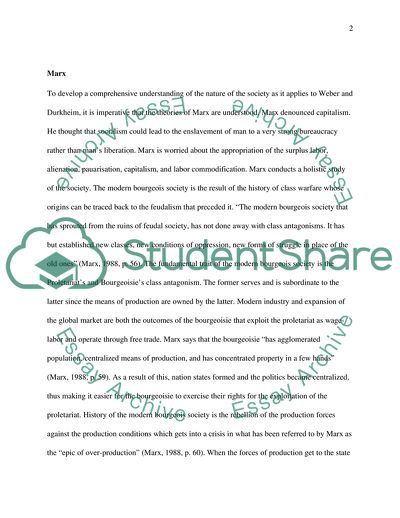Cite this document
(Comparison of Marx, Weber, and Durkheim in the Concept of Modern Society Report Example | Topics and Well Written Essays - 2500 words, n.d.)
Comparison of Marx, Weber, and Durkheim in the Concept of Modern Society Report Example | Topics and Well Written Essays - 2500 words. https://studentshare.org/sociology/1794733-using-the-early-sociologists-marx-durkheim-and-weber-how-have-they-explained-the-concept-of-modern-society
Comparison of Marx, Weber, and Durkheim in the Concept of Modern Society Report Example | Topics and Well Written Essays - 2500 words. https://studentshare.org/sociology/1794733-using-the-early-sociologists-marx-durkheim-and-weber-how-have-they-explained-the-concept-of-modern-society
(Comparison of Marx, Weber, and Durkheim in the Concept of Modern Society Report Example | Topics and Well Written Essays - 2500 Words)
Comparison of Marx, Weber, and Durkheim in the Concept of Modern Society Report Example | Topics and Well Written Essays - 2500 Words. https://studentshare.org/sociology/1794733-using-the-early-sociologists-marx-durkheim-and-weber-how-have-they-explained-the-concept-of-modern-society.
Comparison of Marx, Weber, and Durkheim in the Concept of Modern Society Report Example | Topics and Well Written Essays - 2500 Words. https://studentshare.org/sociology/1794733-using-the-early-sociologists-marx-durkheim-and-weber-how-have-they-explained-the-concept-of-modern-society.
“Comparison of Marx, Weber, and Durkheim in the Concept of Modern Society Report Example | Topics and Well Written Essays - 2500 Words”. https://studentshare.org/sociology/1794733-using-the-early-sociologists-marx-durkheim-and-weber-how-have-they-explained-the-concept-of-modern-society.


